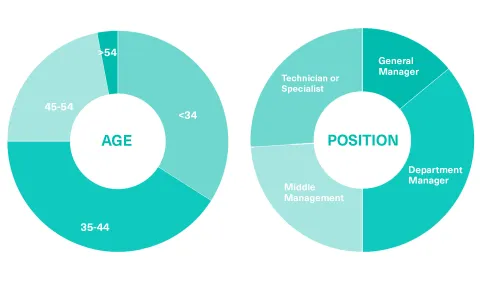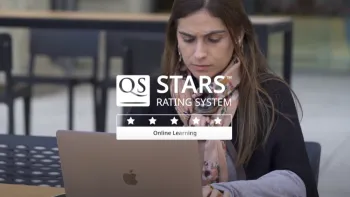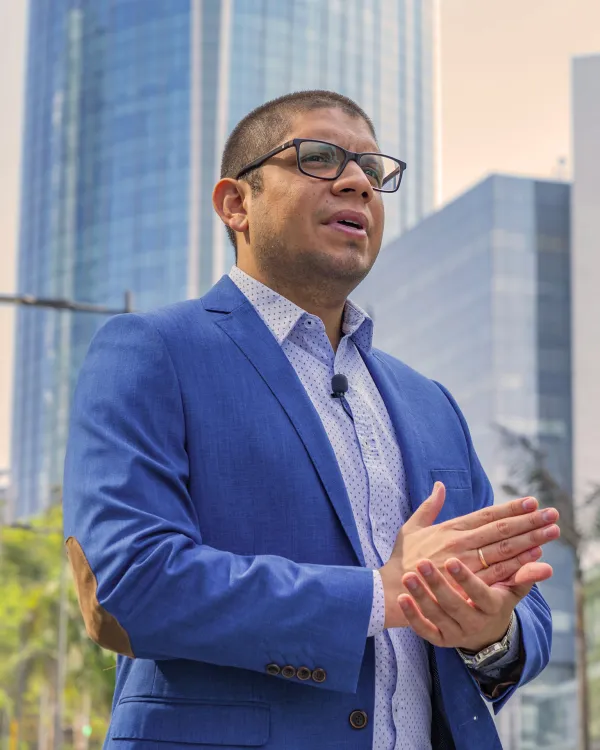
Master in Digital Transformation
- ONLINE
- 60 ECTS
- 7700€
- OPEN CALL
- 12 MONTHS
- SPANISH
The Master in Digital Transformation provides you with the necessary knowledge to define, implement and follow innovative business digitisation strategies to face the current market and enhances your leadership and team management skills in digital environments.
This programme is recognised with the 5th position in the category of Digital Transformation of Online Masters in the Ranking El Mundo and is placed in the TOP 10 in Spanish in the category of e-Business and Digital Marketing according to the Best Masters Ranking of Eduniversal.

Master in Digital Transformation (Spanish)

Universitat de Barcelona
Get a double degree from our academic partner, the reference university in Catalonia and Spain with more than 560 years of history behind it.

Ranking El MundoSystem
The programme is recognised with the remarkable 5th position in the Digital Transformation category of the Ranking of the Best Online Masters in Spain according to the newspaper El Mundo.

Eduniversal Ranking
The Master in Digital Transformation is considered TOP 10 best master in Spanish in the e-Business and Digital Marketing category of the Eduniversal Ranking.
Objectives
OBJECTIVE 1.
DIGITALISATION
Understand the benefits of digitalisation and promote the necessary changes to improve the management and direction of an organisation, orienting the business strategy to the digital environment.
OBJECTIVE 2.
MANAGEMENT SKILLS
Strengthen your leadership and team management skills to manage projects of any size and lead the change in your organisation.
OBJECTIVE 3.
DIGITAL DEVELOPMENT PLAN
Identify the key aspects of a digital change and transformation process in order to be able to lead such processes in a real company.
OBJECTIVE 4.
INNOVATION
Understand the importance of innovation as a strategic pillar for the generation of competitive advantages from a business model point of view.

Syllabus for the Master's Degree in Digital Transformation
Our programme is structured in 2 blocks and culminates with the Master's Thesis. In addition, during the development of the programme, different additional activities will be carried out.
Block 1. Management skills
Block 2. Digital transformation of business
Master's Final Project
Bootcamps and Additional Activities
1. Management skills
Digital competences are essential to work in a world in which digitalisation is increasingly present and important. In this context, developing "digital talent" will be one of the differentiating elements in a world that is increasingly globalised and in constant and accelerated change. In this module, students will learn about the new ways of leading in a context of change and will acquire the necessary skills to grow in the business.
Professor: Marta Grañó, Diversity, Innovation & People Consultant at Marta Grañó.
VIEW LINKEDIN
The module Prompting with AI agents in business processes teaches how to design and optimise prompts to interact with artificial intelligence agents in business environments. Participants will learn how to apply these tools in process automation, personalisation of experiences and strategic decision making, integrating AI into business systems in an ethical and efficient way.
Professor: Santiago Román, Digital Project Manager
VIEW LINKEDIN
Digital businesses, by their nature, require innovative project methodologies. They are projects with a lot of uncertainty that require fast development times, which are achieved with incremental iterations in order to meet the established time to market. This course presents innovative alternatives for managing digital projects compared to traditional forms of IT project management. It provides you with criteria for selecting the most appropriate project management approach for each project depending on the circumstances of the project and stakeholders, as well as its absolute and relative complexity.
Professor: Xavier Olivares Veciana, Fundador, director y consultor en Isotònia Innovation Lab.
VIEW LINKEDIN
2. Digital transformation of businesses
Deep Tech on Business explores the impact of disruptive technologies, such as artificial intelligence, data analytics, 5G, augmented/virtual reality and quantum computing, on business, especially in the financial sector. It looks at how these Key Enabling Technologies (KETs) transform industries, with a focus on digitisation and the evolution of business models. Analytical tools such as Gartner's Hype Cycle and Wright's Model are studied, and case studies in areas such as crowdlending and P2P lending are examined. The course aims to show how Deep Tech technologies can generate sustainable competitive advantages in a disruptive business environment.
Professor: Marc Sansó Mata, Fundador de ELSEBITS.
VIEW LINEKDIN
Digital Marketing has revolutionised the way we do business, and no corporation, company, business, entrepreneur or professional (whether or not in the marketing area) can ignore its vital importance in achieving success. The digital world has blurred the walls between the areas of Marketing (on and off line), PR, IR and Customer Service, mainly because in the Digital Ecosystem the customer demands to be kept informed, to be listened to and to be attended to for any query or complaint, through any channel. Digital Marketing is closer to a dialogic communication strategy than to advertising, and if there is anyone authorised to talk about the evolution of marketing mix strategies, it is Philip Kotler, who is considered the "father of marketing". In order to get to know and situate the theoretical framework of this subject, we’re going to start with Philip Kloter's new book "Marketing 4.0".
Professor: María Esther Pérez Tenorio, Fundadora de DirCom Agency, agencia especializada en marketing digital avanzado, SEO y comunicación asistida por inteligencia artificial.
VIEW LINKEDIN
Customer management is undoubtedly the most important function in business. It means investigating where current and potential customers are, getting to know those who already work with us, actively listening to what they want, prioritising their habits and establishing actions to guarantee their permanence. During this course, students will immerse in the definition and basic concepts of a customer management system and learn to clarify some of the confusion that still exists between direct marketing, relationship marketing and customer loyalty. They will also learn about the introduction of the commercial system in companies and its integration in distribution channels, as well as familiarize with the necessary tools and procedures for the deployment of a relationship system (CRM) in the company.
Professor: Gustavo Rojas Pávez, Co-Founder, Future & Customer Experience at Personas Design.
VIEW LINKEDIN
In the era of information and digital transformation, strategically managing Business Intelligence (BI), Big Data and Business Analytics (BA) Information Systems is essential for organisations, as they can improve the efficiency of operations by providing better visibility, control and greater agility and transparency through the creation, use and exploitation of these technologies. In this module, students will review the importance of collecting, transforming, analysing and measuring this historical and predictive information through an appropriate BI strategy and always with a clear prior definition of the business requirements; you will see the evolution of BI, which processes and business areas it affects, how this information is obtained and aggregated from different sources, channels and data origins, and how these support digital transformation.
Professor: Jesús Cristóbal Asorey, Business Intelligence and Qlikview Expert.
VIEW LINKEDIN
The supply chain is the competitive and differentiating factor by which companies can either stand out in the market or remain stuck in an all-out battle in the red oceans. Technologies have always influenced the development and operations of the supply chain, and innovations in transportation modes have been a substantial resource for overtaking competition in markets, especially in internationalising companies. However, in recent years, digitalisation has brought about a substantially different change; it has offered solutions that radically change concepts and paradigms in all sectors. Throughout this subject, you will see the process of digitisation of the supply chain, the technologies in the digitisation of the supply chain and the possibilities of innovation in processes within the framework of the digitisation of the supply chain.
Professor: Roy Mouawad, Director of Quality, Dean, Campus Director, Professor at Geneva Business School.
VIEW LINKEDIN
Since 2014, Internet access from mobile devices has surpassed access from traditional desktop and laptop computers. This data indicates that the playing field is changing radically and that in the near future, companies' strategies must be focused on mobile devices. Access from mobile devices is based on the use of applications, which is why we must be aware of everything that is happening in this sector. In this module, students will face the change of business model that is taking place in mobile applications and learn how it’s focusing more and more on the benefits of advertising. You will learn about the strategies of big companies in the sector, such as Google and Facebook and how they carry out innovative marketing and brand awareness campaigns through these new options.
Professor: Juan Manuel Agudo, Head of Porduct at Stubhub.
This module focuses on how blockchain works and how it can be applied to securely and immutably record transactions and information, as well as its conceptual fit with other disruptive technologies such as quantum computing, IoT (Internet of Things), 5G, Big Data and AI. This will allow us to discuss the suitability or otherwise of blockchain in certain projects and will enable us to consider different real-world use cases in various sectors.
We will also look at some of the main existing blockchain platforms and other terms, concepts that are becoming highly relevant thanks to blockchain.
This is enabling the emergence of new emerging technologies that are starting to be used in the digital transformation of companies through the digitisation of assets and the creation of fungible, non-fungible tokens (NFTs) and semi-fungible tokens. Innovative decentralised finance (DeFi), which promises to redefine the world of the decentralised economy (loans and financing models such as ICOs, among others), is also booming. The emerging universe of the metaverse is also integrating with blockchain, tokens and DeFi to build a new virtual digital environment.
Professor: Christian von Eitzen Delgado, Co-responsible for information systems, data networks and computing at IESIDE.
VIEW LINKEDIN
Master's Final Project and Additional Activities
This programme is designed to complement the content of the thematic blocks with the necessary training to achieve their internalisation. The training is conceived from a threefold perspective: technical assistance, personal support and individual and group challenges that are necessary to achieve the objectives set.
Pre-Masters Bootcamps
The student will have the opportunity to take 3 Pre-Master Bootcamps that will be opened progressively and can be taken at any time. Once the course has been completed and passed, a certificate of completion will be awarded.
- Bootcamp 1. Personal Branding
- Bootcamp 2. Data Storytelling
- Bootcamp 3. Creative thinking and innovation
- Bootcamp 4. IA Generativa: Ingeniería de Prompts
In addition, students will also have the opportunity to take these pre-master courses; however, these are available in English only:
- Building Your Professional Brand for Employability and Career Success
- Finance Fundamentals
- Organizational Well-Being
Introductory workshop | Campus Training
Before the start of the academic year, students will have the opportunity to attend an introductory workshop on the Campus, where they will be provided with the necessary tools and knowledge for the correct use of the platform during the academic year.
Professional Development Programme (PDP)
Two weeks before the start of the academic year, students will be able to participate in a professional development programme, where they will work hand in hand with a teacher to develop skills such as time management, productivity, stress management and emotional intelligence. Once the student has successfully completed the workshop, he or she will receive a certificate of completion.
The main objective of the Master's Thesis is for you to work on a group project that allows you to put into practice all the knowledge acquired throughout the Master's degree. Beyond an academic activity, this is an opportunity to connect your education to the economic and business reality.
Tutors team
Bootcamp: Large-scale digital transformation: The case of China
The objective of this bootcamp is to understand how the digital transformation of the Chinese economy is largely based on the firm commitment of the authorities to give the leading role to a set of highly innovative companies.
Professor: Tom Van Der Heyden, Co-founder and CEO at S3 Group.
VIEW LINKEDIN
Bootcamp: Practical application of Tableau
This bootcamp aims to help students learn about the Tableau tool focused on data visualisation to facilitate Big Data analysis. Tableau is one of the most widely used tools in business intelligence, which is why getting familiarized with its basic aspects is essential.
Professor: Jorge Muñoz Paniagua, Researcher at ETS Ingenieros Industriales UPM.
VIEW LINKEDIN
Bootcamp: Introduction to cybersecurity
With this course, students will be able to have a first approach to the whole area covered by cybersecurity within organisations and it will be fundamental for a better understanding of all its components.
Professor: Óscar Quero Hijano, Director del Departamento Tech & Supply en EAE Business School. Madrid.
VIEW LINKEDIN
Bootcamp: Agile project and product management
Digital businesses require adaptive management methodologies due to their dynamic nature and high uncertainty. This bootcamp presents innovative approaches to managing digital projects compared to traditional methods. It focuses on selecting the right approach based on factors such as project complexity, agreement on scope, available knowledge and interaction with stakeholders. In addition, it offers strategies for managing distributed teams and fostering collaboration, improving the capacity for innovation in digital project management.
Professor: Paula Kvedaras Mercado, Founder & Director at Consultora BK®, Latin America.
VIEW LINKEDIN
Company visits
During the development of the programme, the student will have the opportunity to attend synchronous videoconferences with professional experts that will share their experience and provide advice on some of the best practices in the sector.
Webinars
Most of the training is done asynchronously, that is, the exchange of knowledge is done through a platform that allows sharing written texts without the need for people to be connected at the same time.
Additionally, in each of the modules, synchronous sessions or 'webinars' are organised, where all participants are connected at the same time through an application, which allows the exchange of knowledge in 'real time'.
Students taking the Master in Digital Transformation will have the opportunity to prepare for the following certifications:
• Certificación Scrum Master & Product Owner
• Certificación Scrum Master@Scale
• Certificación Productot Owner@ Scale
• Certificación Value Stream Management
*The cost of the certifications, as well as the preparatory course, is not included in the price of the programme.
Methodology

OBS has an online methodology where the core is the student. Always backed by active and internationally renowned lecturers, who share their knowledge to enhance the professional development of students through a flexible, collaborative method with personalised monitoring. The aim is to create a unique educational experience that allows the assimilation of knowledge in a practical way.
Student ON's fundamental pillar is the student and, for this reason, throughout the course students have their Programme Manager, an academic figure who accompanies them in a personalised way.
Diploma
After successfully finishing the Master's degree, and having completed the relevant procedures, you will receive the Master's degree from OBS Business School. In addition, and provided that you meet the established academic and administrative requirements, you will obtain a Lifelong learning Master's degree from the Universitat de Barcelona (UB).
In order to obtain it, you must have a university degree. In the exceptional case of not having this degree and having passed the Master's evaluations, you will obtain a Higher University Diploma from the Universitat de Barcelona (UB).
At OBS Business School we are committed to having our own degree, which allows us to quickly update and adapt the programmes in each edition to be at the forefront of the educational level demanded by companies today. Our programmes are designed for professionals who want to strenghten their management skills and learn through an international experience.

Admission Process
The fundamental aim of our admissions process is to ensure the suitability of candidates. All participants should get the most out of this learning experience, through a context in which it is possible to develop long-term relationships with classmates, faculty and alumni.
After completing the application form for one of our programmes, you will receive an e-mail with information about the School and a member of the Admissions Department will contact you to start the admission process.
Once you have successfully passed the personal interview, you must submit all the required documentation to continue the admission process and certify that you meet the requirements of the student profile. After the Admissions Committee, if it is positive, you will be able to register and enrol in the programme you have applied for.

Student Profile
The Master in Digital Transformation is aimed at professionals who wish to work in the management, administration or consultancy of information systems and technologies.

Professional Opportunities of the Master in Digital Transformation
Thanks to the Master's Degree in Digital Transformation, you will be able to access positions such as:o:
- Leader of Digital Transformation Processes
- Change Manager
- Digital Marketing Manager
- Business Manager
- Digital Transformation Consultant
- Digital Project Manager
- Chief Digital Officer (CDO)
- Digital Analyst
- Digital Strategy Manager

